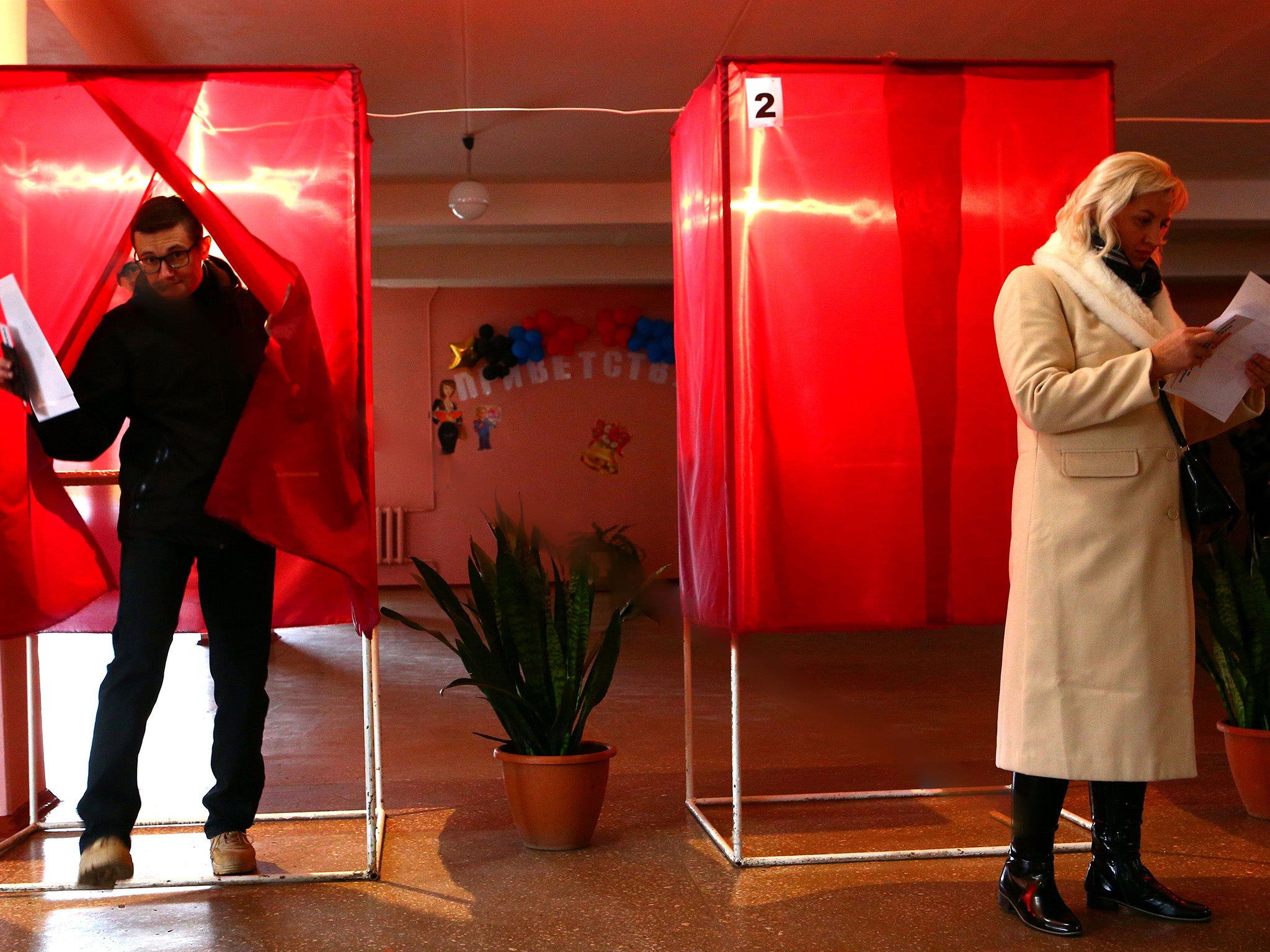Dirty tricks, roaring ‘silence’ and nationalist threats: Ukraine readies itself for elections
Sunday’s election promises to be the most competitive – and among the dirtiest – in a generation

Candidates in Ukraine’s presidential elections have ended formal campaigning ahead of Sunday’s vote, one of the most unpredictable in the country’s history.
According to electoral law, Saturday was formally designated a day of silence from campaigning and political advertising. But the leading candidates did what they had done throughout the campaign – pushed the rules to the extreme, and then some.
On Saturday morning, the incumbent Petro Poroshenko held a “prayer morning” on Saint Volodymyr Hill in Kiev. An official briefing by the presidential press-service said it was a non-campaign event being held for the “wisdom and unity of the Ukrainian nation”.
Meanwhile, television screens across the country flickered with the face of the campaign’s surprise favourite, showman Volodymyr Zelensky.
None of the day’s programming on the national 1+1 TV channel formally referred to a presidential candidate – only Mr Zelensky’s on-screen alter-ego Vasily Goloborodko and the narrator in a documentary about Ronald Reagan, an actor who happened to become president. But it was an audacious circumvention of the law that seemed to bear the clear imprint of Ihor Kolomoisky, the channel’s controversial oligarch owner and Zelensky backer.
At a campaign rally in western Ukraine on Thursday, Mr Poroshenko accused Mr Kolomoisky of funding his two main rivals, Mr Zelensky and Yulia Tymoshenko.
The Ukraine frontline – in pictures
Show all 6“He may have fled abroad, but he is moving two pieces on the election chessboard,” Mr Poroshenko said.
Overall, voters will have to choose from a record 39 candidates.
Some are campaigning to raise their profiles. Others – like the ex-minister trying to find a wife – are campaigning to raise a laugh. The majority of the names seem to be filler candidates, funded by leading candidates with the aim of getting more representatives into sensitive monitor positions in polling stations. Or, alternatively, to confuse voters away from rivals (eg the candidacy of Yury Tymoshenko, whose name is nearly identical to Yulia Tymoshenko.
Only three of the list – Zelensky, Poroshenko and Tymoshenko – have a chance of making it through to the next round. And all of them have been accused of using dirty tricks.
If the campaign is anything to go by, the election will likely see a run-out of the most time-tested methods of voter manipulation, from bribing voters with pension payouts and cheap vegetables, to more brazen voting falsifications around the polling booths themselves.
A lot of attention has focused on the use of so called election “grids” (setki), in which on-ground agitators are paid to recruit supporters to a candidate’s cause. Political experts surveyed by The Independent suggested such schemes could sway the vote by between 5-10 per cent.
The practice is illegal under Ukrainian law, but opponents have accused Mr Poroshenko of rolling out the scheme on a mass scale in order to rescue his presidential bid.
Last week, Ms Tymoshenko directly accused Mr Poroshenko of imitating Ukraine’s disgraced former president Viktor Yanukovych by “buying” votes with 1,000 hyrivna (£30) payments to agitators.
According to Arsen Avakov, the nationalistic interior minister who has been manoeuvring himself as an unlikely guardian of Ukraine’s election, Mr Poroshenko’s campaign has accounted for 60 per cent of verified election violations. But Ms Tymoshenko’s campaign is hardly squeaky clean either, responsible for most of the remaining 40 per cent.
Frontrunner Mr Zelensky’s campaign has not been associated with more of the cruder, and more expensive, manipulation techniques. This is likely as much a consequence of more limited campaign resources. But their choice of novel manipulation techniques – including the use of the candidates’ televisual reach to project his fictional character at the expense of opponents – raises other questions.
Major violations on the day are unlikely to go unnoticed, with civil society organisations closely monitoring the voting process.
But the participation of militarised groups raises the spectre of a different type of scrutiny. Nearly 400 members of the National Militia, an ultra-nationalist movement, for example, have registered as monitors of the vote. They have promised to seize ballot boxes if they “detect cheating”.
Others have speculated that Ms Tymoshenko may bring out her loyal supporter base in a new Maidan protest if, as expected, she is pushed into third place, behind Mr Zelensky and Mr Poroshenko, and out of a second-round run-off scheduled for 21 April. On a talk show on Friday, Ms Tymoshenko distanced herself from such reports.
“I know that the situation is being pumped up aggressively – talk about new Maidans, uprisings, military confrontations,” she said. “I can say that there will be nothing of the sort.”
Mr Avakov has said his ministry had a battle plan to keep order on Sunday, including fast reaction patrols and a police presence at every polling station. Overall 78,000 police officers and 130,000 interior ministry officials will be employed on the day.
Subscribe to Independent Premium to bookmark this article
Want to bookmark your favourite articles and stories to read or reference later? Start your Independent Premium subscription today.

Join our commenting forum
Join thought-provoking conversations, follow other Independent readers and see their replies